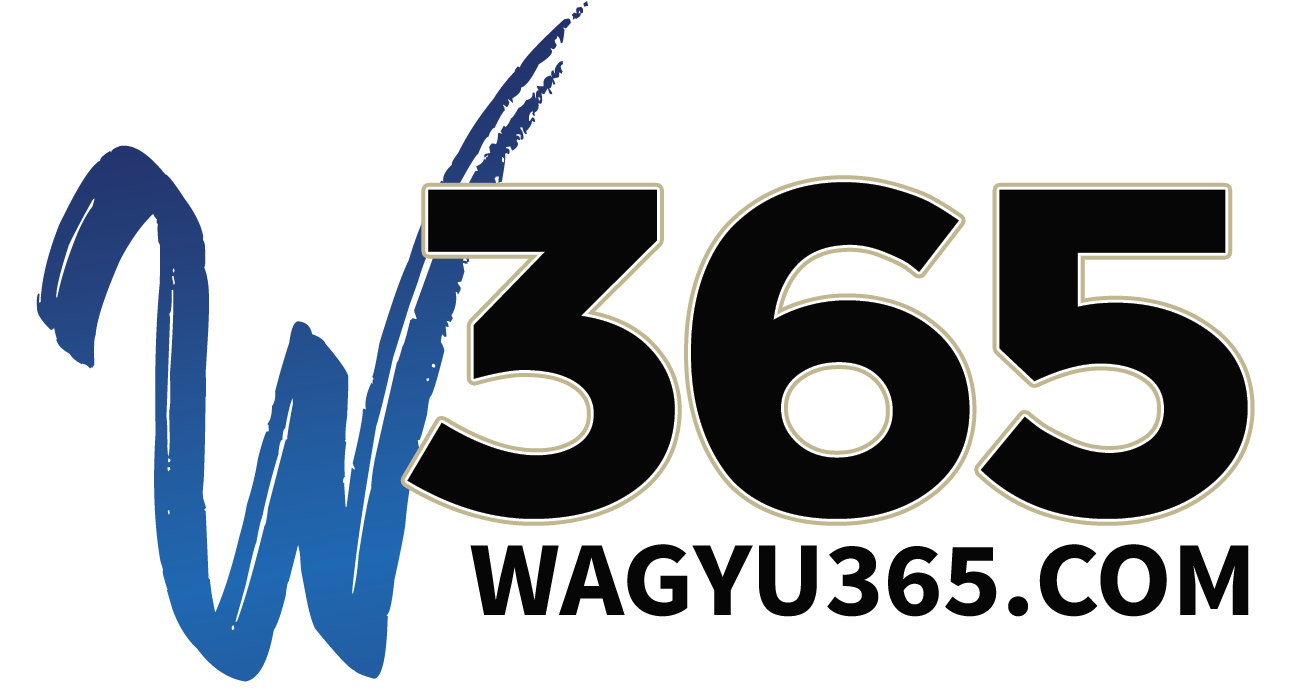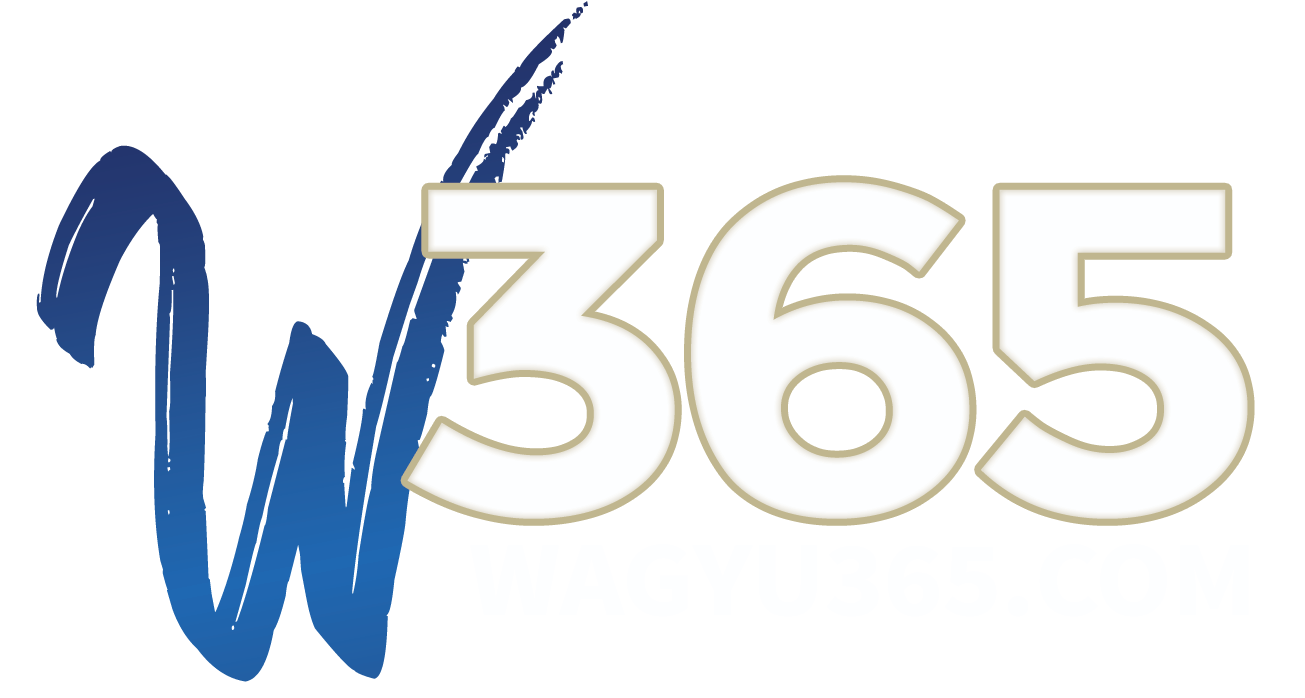
Sumo Wagyu
 The Sumo Wagyu herd is located in the Northern Rivers of New South Wales, Australia, which offers a fantastic base for raising cattle with continuous rainfall year- round. The operation is located on 1200 hectares of premium grazing country, complete with irrigation, and runs approximately 1300 head of cattle. This includes 800 head of full blood Wagyu and 500 recipient females, with an additional 120 elite full blood female donors that belong to an ET program that operates year-round. Sumo’s herd has multiple calving dates during the year due to their intensive embryo transfer programs. These programs utilize every opportunity to perform fresh transfer of embryos to maintain high conception rates.
The Sumo Wagyu herd is located in the Northern Rivers of New South Wales, Australia, which offers a fantastic base for raising cattle with continuous rainfall year- round. The operation is located on 1200 hectares of premium grazing country, complete with irrigation, and runs approximately 1300 head of cattle. This includes 800 head of full blood Wagyu and 500 recipient females, with an additional 120 elite full blood female donors that belong to an ET program that operates year-round. Sumo’s herd has multiple calving dates during the year due to their intensive embryo transfer programs. These programs utilize every opportunity to perform fresh transfer of embryos to maintain high conception rates.
Sumo Wagyu is a family owned business, founded by Dr. Simon Coates who has been involved in the beef industry for more than 50 years. As a qualified Veterinarian and cattle owner, Simon oversees every aspect of the operation- Including artificial insemination, embryo transfer and paddock mating programs. His daughter Georgia Finden manages Sumo Wagyu’s International Sales and Marketing division, while son – in – law Mark Finden manages the embryo transfer programs and is responsible for the herds data and Breed plan analysis.
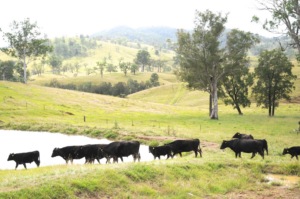
Northern Rivers of New South Wales
As the operation has grown over the years, so has the need to employ key people to keep up with the momentum. Eric Fraser is the Stock Manager and runs the Grafton properties with the assistance of his wife, Miriam Fraser, who also works in Sumo Wagyu’s laboratory. In addition, Sumo Wagyu has a team of two Office Administrators, Ingrid Hebart and Courtney Corcoran, who assist to run the operation’s main office in Brisbane.
In 1991, Dr. Coates used his veterinary and livestock experience to begin Sumo Wagyu with the purchase and import of 250 purebred embryos from USA breeder Don Lively. These embryos were 15/16th Wagyu and bred up from the original import bulls. Following this in 1997, Sumo Wagyu imported 50 full blood heifers and 6 full blood bulls from Japanese master breeder Shogo Takeda. Soon after, Sumo purchased the remainder of Takeda’s Australian herd. As a result of this acquisition, Sumo Wagyu owned approximately 90% of all full blood females in Australia at the time.
Following the purchase of Takeda’s Australian herd, Sumo developed three large scale embryo transfer facilities in Australia, with locations in Victoria, New South Wales, and Queensland. Sumo’s full blood Wagyu genetics quickly began to multiply and thousands of embryos and calves were produced in these E.T centers. Through the sale of these genetics, Sumo Wagyu helped to establish approximately 70% of the emerging Wagyu herds around Australia.
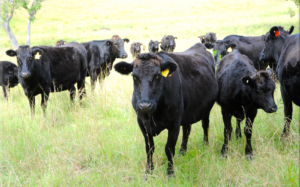
The Northern Rivers provide fantastic grazing for the cattle at Sumo Wagyu
Remaining true to their large scale embryo transfer history, today Sumo Wagyu continues to be a leading supplier of full blood Wagyu genetics to the Australian and International markets. They own a traveling embryo transfer van, which is equipped with a complete laboratory. This technology and has enabled their 8-week ET program to operate year-round in different locations. Through this program Sumo is producing roughly 3000 embryos annually, of which around 2000 are kept for their own breeding programs and the remaining 1000 are offered for sale. They also produce custom embryos for clients looking for specific genetics.
Sumo’s 8-week ET program utilizes only the herd’s most elite females. These donor females are selected based on a specific set of criteria including: medium to large frame, good milk production, and high EBV’s for marble score & carcase weight. In addition, donors must be in good condition and are selected from lines that have both high fertility rates and proven carcase data.
When making mating decisions, Sumo has always had the philosophy of using pedigrees, “ideally blending the 3 strains of black Wagyu (Tajima, Shimane, Tottori) to produce balanced progeny with elevated EBVs for carcase weight, marble score, and milk.” The majority of Sumo’s cattle are 60% Tajima and 40% Shimane/Tottori (approximately). The main focus is on establishing a good maternal foundation with dominant Shimane/Tottori bloodlines that will produce large carcase weights and milk production, while maintaining a good base for marbling. Donor females can then be mated to high Tajima bulls with elevated marble score EBV’s to produce perfectly balanced progeny with size, milk, and high marbling capabilities.
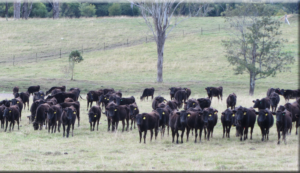 If a donor female does not produce embryos in an ET program, she is put back into calf and will re-enter the program 2-3 months after the calf is born. The introduction of Breed plan data and recessive testing has helped Sumo to track, record, and benchmark their key performance traits. This has allowed Sumo to push to achieve a high TCI (Terminal Carcass Index) for each progeny.
If a donor female does not produce embryos in an ET program, she is put back into calf and will re-enter the program 2-3 months after the calf is born. The introduction of Breed plan data and recessive testing has helped Sumo to track, record, and benchmark their key performance traits. This has allowed Sumo to push to achieve a high TCI (Terminal Carcass Index) for each progeny.
With regard to recessive testing. Sumo remarks that, “a large percentage of original import animals were recessive carriers, because of this it is difficult to maintain good genetic diversity in your herd while remaining recessive free.” It is with that in mind that Sumo says, “we do not place a huge emphasis on this testing. We do however, ensure that if an animal is a carrier for a recessive gene we use a recessive free sire at the next mating opportunity.” In addition, when selecting which elite donor females will be collected for export approved embryos, Sumo makes every effort to try to ensure they are recessive free.
The intensive ET program that Sumo Wagyu operates is only one element of their reproduction programs. Full blood females that are not used as recipients for the ET program are bred using artificial insemination (A.I.). Sumo uses a synchronization program and timed A.I. to ensure females are all cycling and come on heat. Their program uses a progesterone implant and a prostaglandin injection upon removal of the progesterone implant to bring the cows on heat. The cows are then bred using two straws of high quality semen 12 hours apart post heat to ensure a high conception rate. Two weeks after A.I, an elite sire will be purposefully picked for the best genetic diversity and placed in the paddock to clean up and cover any females that did not conceive with the A.I.
Whether it be through ET or A.I., when breeding for herd replacements Sumo is looking to focus on females with good milk production for calving, medium to large mature cow weight for overall size, marbling, and fertility. Sumo believes, “a female with these traits will help produce the best possible progeny outcome and will also be capable of raising a calf in harsh conditions.” When breeding bulls, a high marble score EBV and large carcase weight EBV is their main focus, because Sumo says, “these are the core values that drive the profitability of the Wagyu supply chain.” While breeding for replacements Sumo is trying to also improve any performance traits that a specific animal is lacking.
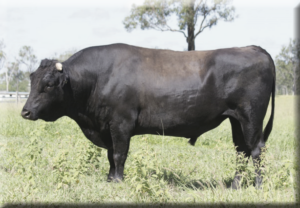
Sumo Cattle Co Michifuku F126
Sumo Wagyu’s long-standing elite ET program has provided the opportunity to work with many elite donors. Through these programs, some individual animals have emerged as being exceptionally superior to the rest. For Sumo, two cows stand out as their best: Sumo Fuku J216 (SMOFJ0216) and Sumo Fuku K136 (SMOFK0136). These two elite females represent some of the highest TCI females and are sired by two of Sumo’s top-ranking TCI bulls: Sumo Cattle Co Michifuku F154: SMOFF0154 (+$527 TCI) and Sumo Cattle Co Michifuku F126: SMOFF0126 (+$394 TCI). These donor females are very well-balanced animals with both a high marble score EBV and a high carcase weight EBV. Both cows have performed well in Sumo’s ET program, consistently delivering large embryo numbers. Sumo Fuku J216 comes from the Aizakura maternal line, which has produced the top ranking TCI bull Macquarie Wagyu C1176, with a TCI of +$633.
The other elite donor, Sumo Fuku K136 comes from what Sumo considers their best maternal line, the Hikokuras. Sumo believes that of the original Takeda genetics that made up their herd foundation, TF Hikohime 34/1 (IMUFR3232) and TF Dai 2 Kinntou 3 (PEDFA2453) formed their best maternal lines, because, “these females had a perfect phenotype with incredibly large frames, flat backs and high milk abilities, whilst at the same time providing consistent marbling quality in resulting progeny.” Both of these animals trace back to Ezokintou 1A, a common matriarch of the world renowned Hikokura maternal line. These two cows have formed maternal lines in the Sumo herd that have consistently produced high marbling and large carcase weights. To top it all off this family has consistently flushed well in the Sumo ET program. In terms of individual success from this line, Dai 2 Kinntou 3 is the dam of the famous Takeda Farm Terutani 40/1, who is considered to be one of the most balanced foundation sires. On the other side of the family, Hikohime 34/1 is the dam of Coates Nami A89: CCOFA0089, who consistently produces 15 or more grade A embryos each flush.
TF Dai 2 Kinntou 3 has continued her pattern of success in the Sumo herd, showing up as a dominant maternal line in two of Sumo’s elite bulls: Sumo Cattle Co Michifuku F154: SMOFF0154 and Sumo Cattle Co Michifuku F126: SMOFF0126. Both sires have high marble score EBV’s of +1.9 and +1.5, along with high carcase weights EBV’s of +27kg and +17kg. These high EBV’s lead to elevated TCI’s of +$527 for F154 and +$394 for F126.
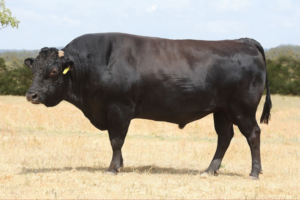
Sumo Cattle Co Michifuku F154
When selecting terminal sires Sumo looks for bulls with a high TCI, superior breeding (pedigree), and excellent EBV’s for marble score and carcase weight. Along with this, Sumo sires must be structurally perfect, have good semen motility & morphology, have strong growth and a desirable temperament.
Sumo’s emphasis on balanced EBVs for both marble score and carcase weight has led their ability to breed award winning sires. This has been evident in new top ranking proven sire Coates Itoshigenami G113: CCOFG0113, who has a TCI of +$561. G113 has some of the most balanced and all-round strong EBV’s of any bull in the Wagyu breed and is now working successfully in the Macquarie Wagyu program.
To prove up their own sires, Sumo has developed an excellent relationship with their feedlot who provides them with carcase data direct from the processor (abattoir). This data is then submitted to the Australian Wagyu Association and loaded into Breed Plan. Sumo’s elite sires are consistently producing marble scores of 8 to 9+ in the feedlot. This enables their sires to be benchmarked against other sires and ultimately proves the genetic value of their stock.
Genetics from Sumo’s high-ranking sires, Sumo Cattle Co Michifuku F154: SMOFF0154 and F126: SMOFF0126, are highly sought after. Presently, Sumo’s largest market is the domestic market in Australia for full blood bulls, breeding females, embryos, and semen.
The international market for premium quality full blood Wagyu genetics (embryos & semen) is growing rapidly, with Sumo seeing large markets develop in South Africa, South East Asia, the United Kingdom, Europe, USA, Canada, and New Zealand. Sumo is noticing a real demand for breeding stock with a high marble score EBV and a high Terminal Carcase Index, sired by bulls with proven carcase data.
Sumo attributes the introduction of Breed Plan data as the driving force behind this trend, with the most sought-after animals being those that deliver on multiple key performance traits such as marble score, carcase weight and milk.
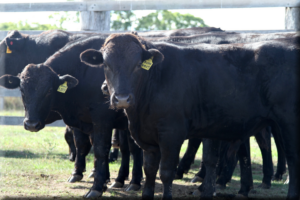
Another growing part of Sumo Wagyu’s domestic and international markets is their Red Wagyu or Akaushi program. Approximately 5% of the Sumo herd is Red Akaushi Wagyu. Sumo has always had an interest in Red Wagyu because they suit the Australian conditions. Red Wagyu are genetically excellent milk producers and raise large beautiful calves. Sumo states, “the Red Wagyu colour and ability to produce an increase in meat quality is complimentary to the large number of Red Brahman cross cattle eg: Santa Gertrudis and Drought Master cattle that exist in the millions in Northern Australia.” In Australia, “the Red Wagyu strains are not as popular as the black Wagyu in Australia as the red varieties are still in their infancy.” Sumo foresees Red Wagyu gaining popularity in the next ten years due to their large frame and great foraging abilities that are well suited to the Northern pastoral conditions of Australia.
The future of the Wagyu breed is looking bright, as international markets continue to grow and a population of consumers emerge who demand a better beef eating experience. Sumo Wagyu sees their bright future as continuing to breed elite full blood Wagyu genetics for hungry Wagyu breeders, processors & investors both domestically and internationally. These buyers rely on sourcing superior genetics that will deliver greater market profitability at each stage of the supply chain.
